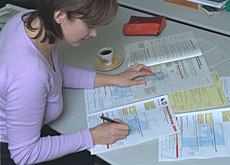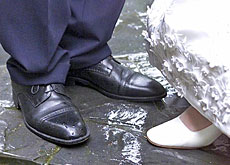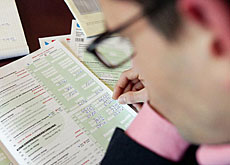Simplified tax scheme promises lower burden

Taxpayers are being offered the chance to make savings with a new self-assessment system that reduces the annual mountain of forms to a single sheet of paper.
The centre-right Radicals are launching a people’s initiative supporting their Easy Swiss Tax scheme in canton Zurich this weekend. The party vows eventually to force through income tax reforms nationally.
The system claims to have the potential to save a married couple with two children living in Zurich city more than SFr2,500 ($1,993) annually. This is based on a combined income of SFr104,000 and assets of SFr100,000.
It would do this by reducing administration costs that would be passed on to citizens via a cut in tax rates. If all goes according to plan, high and low income earners would pay five per cent less income tax and those in the middle bracket would enjoy between ten and 15 per cent cuts, the Radicals say.
The proposed new form dramatically pares down the current array of entries that have to be filled in. For example, tax-deductible transport costs for work purposes would come under one entry, regardless of the mode of transport used, and would also have a flat rate.
Harmonisation hurdle
Hans-Peter Portmann, Radical party parliamentarian in canton Zurich and author of the scheme, believes it is time for a change.
“The current system is so complicated that many people have to pay for a professional to fill in their form,” he told swissinfo.
Other cantons, notably Basel Country and Aargau, are poised to follow Zurich’s lead. But one obstacle in the way of implementing Easy Swiss Tax regionally is the Federal Tax Harmonisation Act that has compelled cantons to standardise definitions of income and deductions since 2001.
“Before we can introduce this new system we need reform at the federal level. But we are confident that people will support these changes,” Portmann said.
The proposed system has so far met with a mixed response. The centre-left Social Democrats support the basic principle behind the idea, but fear there is a risk that local authorities will end up with less cash to pay for services.
“The forms are so general that we cannot see how they can be applied to every individual,” added canton Zurich parliamentarian Regula Götsch. “We will not be supporting the idea and we do not expect it to come into force.”
Intellectually possible
Michael Nordin, a tax expert at Schellenberg Wittmer law firm, also believes the simplified Easy Swiss Tax form is too vague.
“The weak point of the whole idea is that it does not take into account individual needs,” he told swissinfo.
“For example, it does not allow for people who have property in other cantons, people with complicated travel expenses or people who need help at home to care for a handicapped dependent.”
Nordin also rejects the idea that income tax self-assessment is too complicated in Switzerland, especially when compared to the same system in the US.
“Anyone who has had a reasonable education can fill out these forms. It is not impossible from an intellectual standpoint,” he said.
“I suspect that those who chose not to fill in their own forms are simply not willing to spend the time on them.”
swissinfo, Matthew Allen in Zurich
A People’s Initiative at cantonal level requires only 6,000 signatures, unlike the 100,000 needed to force a national debate.
Once presented to the Zurich cantonal government, the initiative would compel the authorities to come up with a proposal to change the system.
If this proposal cannot be agreed upon, then it could trigger a referendum in which all voters will have a say.
Individuals resident in Switzerland pay income tax at federal, cantonal and communal level. Each canton sets its own rates so the tax burden varies according to where the taxpayer lives.
A separate wealth tax on assets is set only at cantonal level. The annual wealth tax also varies, but is usually set at around 1.5%.
On January 1, 2001, all cantons had to bring their income and wealth taxes into line with the Federal Tax Harmonisation Act. This sets rules for what is considered to be income, and standardises deductions and allowances. However, it does not affect the sovereignty of cantons to set their own rates.
Some cantons have introduced a regressive tax rate system, that levies less tax on high income earners.

In compliance with the JTI standards
More: SWI swissinfo.ch certified by the Journalism Trust Initiative



You can find an overview of ongoing debates with our journalists here . Please join us!
If you want to start a conversation about a topic raised in this article or want to report factual errors, email us at english@swissinfo.ch.